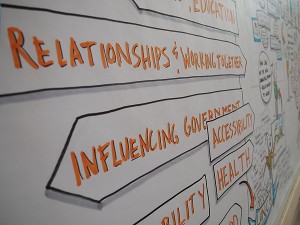Art of Hosting in Practice
All around the world there is a growing community of people from many walks of life who are learning, practicing and reflecting on the Art of Hosting Conversations that Matter. This community of practice is engaged in fascinating projects around the world.
The Art of Hosting is being used at all levels of society, in Business, NGOs, Communities, in government, local as well as national and regional, in families and in more complex multistakeholder processes.
The Art of Hosting is being used as a basis for innovative work in healthcare, education, with young people, in the justice system and in many other places. It enables those feeling called to grapple with large issues both a framework and an approach that hones their skills, builds their capacity and offers an invitation to others.
Education
All around the world, education is both touted as the foundation for civil society and seen as an on-going challenge. Too many children are failing, teachers are challenged with packed classrooms, and many parents wonder what their children are learning that will help them navigate and learn in a world of ever growing complexity.
Art of Hosting practitioners are taking the practices into the classroom with great results. Using circle to help children prepare for day’s lesson, World Café as a way for groups to share what they already know and identify what they need to study, Open Space as a way to share knowledge and inquire into topics together are some of the ways that participatory practice helps students to take responsibility for their own learning and gain skills in working well in groups. This approach recognizes that students need to be active learners and encourages teachers to host the learning, rather than being solely responsible for content. The result is a field of learning where everyone is engaged.
Healthcare
Art of Hosting is beginning to make inroads into the practice of healthcare. A decade-long inquiry into affordable healthcare in Columbus, Ohio, USA is built on Art of Hosting practice. Starting with the head of the Medical Association, who found colleagues and partners in other leaders across the community, Our Optimal Health is an initiative that has included medical practitioners, patients, healthcare organizations and the wider public.
It is an on-going inquiry aimed at streamlining and strengthening affordable healthcare across the community and a model of how participatory practices can make a change in the way complex and challenging community issues can be worked with. Many other initiatives and inquiries have sprung from this work. Inside the Medical Association itself, it is proof that participatory practice works alongside standard organizational practices in ways that bring successful results.
Youth
“Young people are our future!” so many of us say, but how do you welcome and work with the energy of youth when they are disengaged, disenfranchised and disappointed with what life offers? The Art of Hosting community is using participatory practice to create spaces and places for young people to learn collaborative skills and work on issues that are important to them.
In places like Nova Scotia and Ontario, in Canada, practitioners have used the motto “if it’s about us, don’t do it without us” to focus on bringing young people into community conversations, teach them participatory skills and mentor them to take the lead with great results. Art of Hosting’s very fluid and participatory style suits both younger generations and intergenerational work.

As an educator in a progressive institution, I have found the theory and practice of the Art of Hosting tremendously valuable as they increase the potential for learning and can create – when well used – a safe space where the learners’ assumptions can surface. Some of the key insights about leadership for sustainability on the learning journeys of our MSLS students depend so much on the quality of the conversations we host, and such learning moments I believe would not happen without skillful use of AoH techniques.